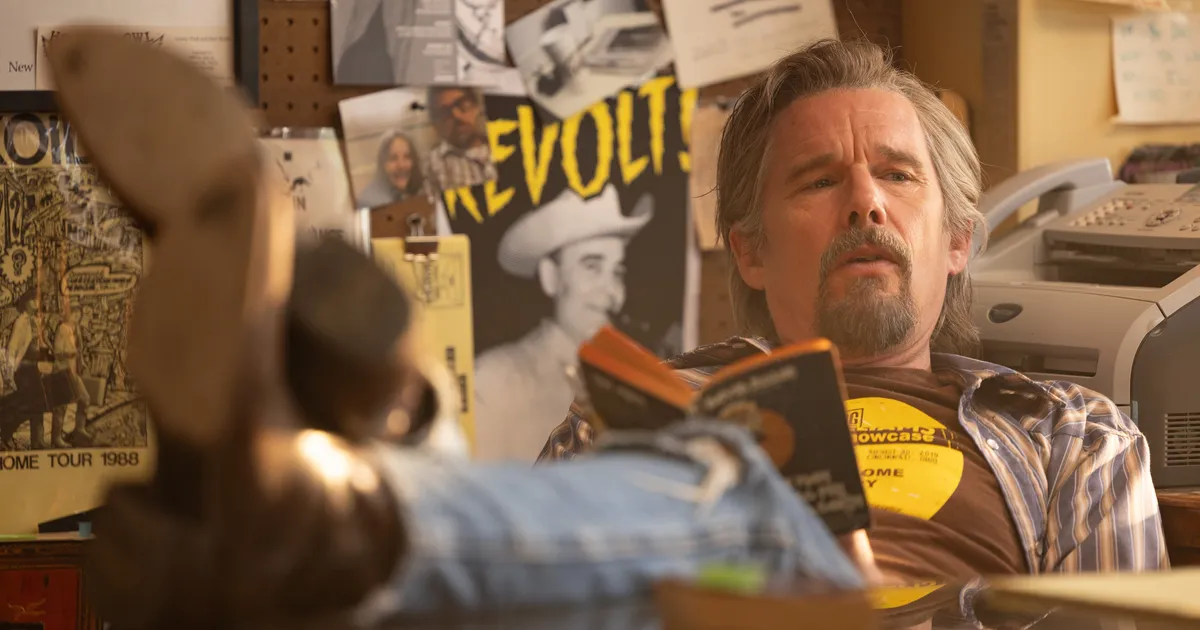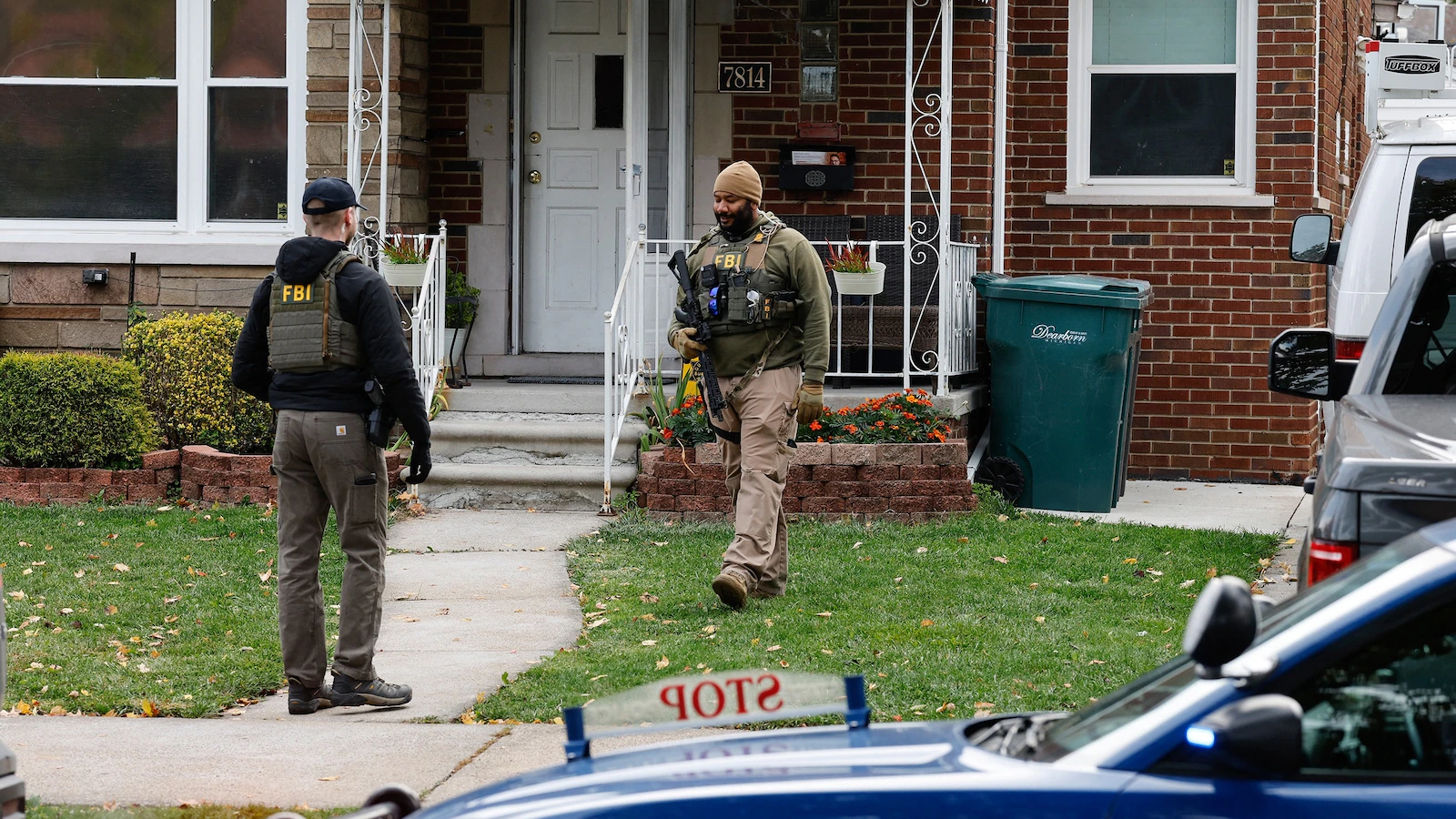Copyright Vulture

By the end of The Lowdown, Ethan Hawke’s Lee Raybon has confronted many misconceptions. The truth teller/journalist/gadfly/detective set out to uncover the truth about the death of a member of a powerful Tulsa political family but must acknowledge how much harm his investigation has caused. An elderly Indigenous man, played by Graham Greene, dies because of Lee’s thoughtlessness, and though Lee eventually pieces the mystery together, he can’t take any credit for it or even publicize most details of the crime. Hawke finds Lee to be a guy not too far from himself. He, too, can’t stop getting worked up about the things he knows are wrong, and he struggles to balance his curiosity and ego with the needs of the people he loves. He is also, like Lee, a father who thinks about the relationship between what his child needs and his own pursuit of the truth, and they both think a lot about art, authenticity, and how the world works. In fact, when Hawke briefly pauses our conversation to go retrieve a toothpick from his backpack, it’s not hard to see Lee Raybon in that moment — though where Lee would have grabbed any convenient toothpick, Hawke laughs at himself for becoming so dependent on a particular flavor packaged in a glass file. (“It’s so stupid, but you go to these events as an actor, and somebody gave me these extremely cool toothpicks, and now I love them,” he says.) Hawke has had a busy fall. His role as tortured lyricist Lorenz Hart in the new Richard Linklater film, Blue Moon, is “probably the most different from me I’ve ever played.” But Lee, he says, “feels right in my wheelhouse of who I am and who I aspire to be and who I think is funny.” Hawke was eager to work again with his friend Sterlin Harjo, The Lowdown’s creator and showrunner, after he fell in love with Tulsa and its creative community on the set of Harjo’s previous series, Reservation Dogs. “You felt that they were throwing a party and you were invited. You didn’t feel that anybody was ‘working,’” Hawke says. “It’s not that they weren’t working hard, but they’re doing it for themselves, to make you laugh, and make you feel in the ways they thought and felt. There’s so much of contemporary entertainment that feels like it’s got its hand in your back pocket. It’s so wonderful when somebody does something different.” You mentioned in another interview that Sterlin Harjo sent you the Lowdown script by asking for notes on the writing, and you were immediately annoyed because you wanted the role for yourself. What made you want to play Lee Raybon? There’s something about Lee that feels trapped in the ’90s. And I feel that way. There’s a part of me that romanticizes bookstores and places that sell LPs and zines, the whole energy and ethos I grew up with. The romantic, the person who believes in art for art’s sake — not because they want to make a million dollars, not because they want to be important. You know, I was reading this biography of Sam Shepard and there was this really interesting moment when his first play was opening on Broadway and his friends kidnapped him and took him to Atlantic City. They didn’t want him to become a Broadway writer. This is the guy who didn’t go pick up his Pulitzer Prize, didn’t go to the Oscars. That’s a sensibility I grew up with, that this whole world of money and fame and stuff was so obviously fake that you weren’t supposed to play along with it. Lee is a father who wrestles with what his identity means for his teenage daughter. How did that element feed into your relationship to the role? That’s connected to my friendship with Sterlin. With any good piece of personal work, there’s a shadow-self aspect to the subconscious of the material. When Sterlin started out as a filmmaker, he didn’t know if he was ever going to be able to make a living. That put him at such odds with the box society wants. There’s the thing of, How can I teach a kid to follow their dreams if I don’t do it? But if I do follow my dreams, I may not be able to pay my child support. And I had some of that. The life of an actor was so different from what you imagine when you’re 18 and wanting to do it. You don’t really understand the travel aspects of it. Children and family life thrive on routine and safety, and my life has been … that’s been near-impossible. So you’re given this riddle that’s like, Do I give up on this dream, or is there another way to skin this parenting game without absolute failure to the child? The idea of parenthood and how a father’s life shapes his children has been an interesting thread in your work over the past several years. I always feel that when a genre piece functions well, the action, the mystery, or the plot engine is only really relevant in so much as it affects the main character’s emotional life. The event of The Lowdown is not the mystery but Lee’s arrival at his ex-wife’s wedding and being able to be a good man. There’s something exciting about the portrait of masculinity the show offers. It’s a conversation people are having all over the country right now about what positive attributes the male community can give our children. How can we be good feminists, and good truth tellers, and courageous and functioning members of our community — and still be wild? It’s still the things we long to be as young people. And the same is true for the feminine, too. But this show focuses on Lee. This connects to The Lowdown’s fifth episode, in which Peter Dinklage plays Lee’s longtime friend Wendell. The two are trying to reckon with how much damage they’ve caused to other people and how that connects to their masculinity. How much of that was in the script when you started developing the show? How did Dinklage get involved in The Lowdown? Sterlin had this idea of a noir in Tulsa, and he had this mentor, Leroy Chapman, whom he found really exciting, and he thought, What if I took a character like that and put him in Chinatown, or The Long Goodbye? We started riffing on those themes, and the last article Lee writes in the show is called “The Sensitive Kind,” about male sensitivity and how much that’s perceived as our weakness and how that weakness makes us hate ourselves for our vulnerability. Male friendship had to be a part of that. I was driving across the country once, I was maybe 20 years old and was really into acting, and this friend of mine, a brilliant playwright named Jonathan Marc Sherman, said, “I want you to meet the best actor of our generation.” I was like, Oh yeah? All right, cool. Peter was doing some Beckett play at a college in Vermont, and we got there about midnight and I’ll never forget it. The car headlights went up and there was this dude, and his hair was so long it actually dragged on the street behind him. And there he was in my headlights. And I went, “That’s the best actor of my generation?” My friend said, “Yup. Get ready.” In the back of my mind, I was worried Peter was doing us a favor. I directed him in a play a million years ago, and we’ve been in a million workshops, and we run in the same circle but we’ve never acted on film together. Sterlin was saying, “I want to stop the mystery right in the middle of the show and have a whole thing on friendship, and I keep seeing Peter Dinklage.” I exploded. I was like, “Let’s do it! I will text him right now!” We have lost friends. We were part of the same theater company in the ’90s, and the backstory of our characters was so in line with the themes of our life. You can’t run in the arts for 30 years and not run into the ongoing theme of addiction and loss and depression and how different people handle their sensitivity. Some try to inoculate themselves against it. It was a chance to do those scenes with him and have it not be a cameo but really give a performance. And he embraced that. I was so moved to see Graham Greene in this show after his death earlier this fall. What was it like working with him? It’s pinched with sadness because of his passing and because he didn’t strike me as old. He was so playful and fun to improvise with and full of stories. What an interesting life. I’m the perfect age for Dances With Wolves, and I loved him in Thunderheart, and I followed his whole career. To see him in Reservation Dogs was so wonderful, and I thought that show ended so beautifully. To get to do scenes with him, I was in heaven. But I think it was his last performance, and it didn’t feel like working with someone on their last performance. It felt like he was going to do King Lear next year. He was one of those actors who have a million ideas but they’re not self-serving; they’re all pitched in a way that’s like, Would this help the show? The Lowdown has a fascinating way of playing with the idea of Lee’s goodness. He is the hero, yet by the end of episode seven, he’s pursuing the land-ownership mystery even though it will hurt innocent people. And he’s holding a gun in a church full of white supremacists in a way that makes clear that, in this moment, Lee is being the bad guy. This is where Sterlin gets kind of wise. Sterlin’s really funny and eccentric and mysterious and has that thing some filmmakers have, which is voice. When you get to the end of the story, Lee has unquestionably done something good. He definitely has. But he’s made some egregious errors. He gets people killed. I love that about the show and how all the people from Killer Mike’s character to the white-supremacist mother, you know, they’re all different than you think. Sterlin just can’t see two-dimensionally. Can’t do it. Even Jeanne Tripplehorn, her character’s complicated too. She’s a hot mess, but she’s trying to keep her family together and she’s really being fucked with by a lot of dubious people. Donald Washberg, Kyle MacLachlan’s character, he’s malevolent, but he’s also kind of sweet and just playing the hand he was dealt, right? That’s what makes Sterlin’s world so fascinating to me. Yes, and he’s willing to play with tone. The show has a confident grasp of moving between gravity and humor, and I know there was a fair amount of improvisation on set. How much of that was in the script, and how much were you finding while everyone was on set? So much of it happens on set. When the scene gets boring, Sterlin just gets so bored. He loves the eccentricity of real life, the way life doesn’t work in a clear narrative structure. He’s always going to preserve that. It’s like he writes the scripts and then he fucks with them. I think it’s part of the reason I have such a good time working on the show. I met Sterlin as a writer. We started writing something together, which is how we became friends. I had this real interest in the Apache Wars; he had an interest in that subject too, and we had a meeting and we were going on about who has the right to tell the story, you know? Getting into the weeds of that. We decided to write it together, and I really got to see how his mind works as a writer and how he loves playing with genre and the expectations of the audience. He knows exactly how to take a wrench to it and turn it at such an angle that it doesn’t seem ordinary. Who has the right to tell a story is such a big part of The Lowdown, too, right? Yeah, Lee has a huge ego, 100 percent. And the story he ends up writing isn’t the one he set out to tell, either. It comes from real life in a lot of ways. The article Lee writes is a real compromise. He doesn’t take Donald down. He doesn’t do what he set out to do. He does something else that is beneficial: He gets the land by not taking Donald down. But a big part of what Lee’s learning is compromise. There’s an aspect to Lee that is Quixote-esque. He’s chasing windmills, and he wants to be the knight. He learns that if left all alone, he’s going to fuck this up. Learning to play ball a little bit while still accomplishing the mission, losing the battle to win a war, is something he learns. A lot of that is motivated by our lives as professional artists. How can I do what I really want to do, inside something people want to see? Learning how to compromise without losing your integrity is one of the journeys of adulthood. Isn’t that exactly the thing John Brown can’t figure out how to do in The Good Lord Bird? Really, it’s the same crux presented to those ’90s kids we were talking about earlier, the question of whether and how much to sell out. Is that a character type you seek out, or do these roles just come to you? A little of both. You know, we all know this, that sometimes it feels like the universe is talking to you. But it depends on your orientation — what signs you hear and what you see. Can you see the way it’s talking to you? What is the way the river wants you to move? If you can move with the river, life seems to go better. But if you don’t, if you’re just the victim of the river, you have no agency in your life. It’s a balance of figuring out how to listen to your own intuition, follow your own personal ethos, and play well with others. Right when Sterlin and I were working on our first script together was when I had finished The Good Lord Bird, and Sterlin really loved that show, and I really loved Reservation Dogs. There was something simpatico happening that we both felt. What has Sterlin taught you about writing? The same thing Linklater has been teaching me my whole life, which is that humor is the great cure for pretension. You can have lofty ideas, but if you don’t mock them, you’re lost. Could there be a season two of this show? We designed it like a pulp novel. It would be very easy to write another pulp novel with Lee Raybon. Walter Mosley was part of our team, and he’s done that with his Easy Rawlins novels, where some of the characters overflow and some don’t. We wanted it to feel like you could watch this season and, if we never get to make another, it’s complete. It told you a story that has the beginning, middle, and end, and a point and a thesis and all that stuff that I love. It would be really easy to pick up again, but it will depend on whether people watch it. So much of this was us figuring out the tone and the world-building and getting the energy right. I would love another chance to do it again. I could see us doing it even better.



